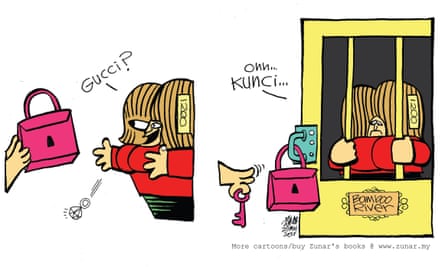Few celebrated the fall of the Malaysian prime minister Najib Razak in last month’s election quite like Zulkiflee Anwar Ulhaque. The country’s most controversial political cartoonist, known as Zunar, had spent the past nine years subject to endless arrests and raids, had nine books banned, was charged under six different laws and still faces nine charges of sedition – carrying a sentence of 43 years in jail – simply for using his pen to critique Najib and his wife, Rosmah Mansor.
Even so, one month after the election victory for the opposition, Zunar admits he has a twinge of nostalgia. Sure, he is free to travel abroad for the first time in two years and the police are no longer haunting his doorstep, but for a political cartoonist, Najib, mired in corruption scandals and murder allegations, and Rosmah, despised for her ostentatious shopping habits, had been “a total gift”.
“Rosmah in particular was a godsend. I miss her, I really do,” says Zunar. “Now they have changed the government it is a challenge for me. What am I going to draw?”
For decades, defying a system of repressive sedition laws and state-controlled newspapers, Zunar has used his hard-hitting cartoons to draw attention to the hypocrisy, financial scandals and cover-ups in Malaysian politics that mainstream media kept under wraps. In turn, since 2009, the Najib government used every tool of the state to go after him, also targeting those who printed and bought his work.

“I always refused to back down,” says Zunar. “In one interrogation by the police I told them, ‘You can ban my books, you can ban my cartoons but you can’t ban my mind. I will keep drawing until the last drop of my ink runs out, you can’t stop me.’ So they tried different strategies after that.”
The police raided his publishers and three different printers – threatening to take away their licences if they continued – confiscated thousands of his books, banned all of his cartoons from being sold in shops, shut down his exhibitions and when, in 2013, he took to selling his works online instead, they arrested his website manager, demanding details of everyone who had bought the works. In 2015, after a cartoon criticising the judiciary, Zunar was arrested again before being charged with sedition.
Now with a new government, led by 92-year-old Mahathir Mohamad, pledging a new era of freedom of expression, Zunar is cautiously optimistic. But while his travel ban was dropped the day after the opposition won the election, he is still waiting to hear whether the new attorney general will continue with the August case for his sedition charges.
“Until they announce the abolition of the printing and press act, the fake news act and the sedition act, then there is no guarantee the new government won’t use those laws again in the future,” he says. “I will still be pushing for reform. It’s not enough to chop some heads, they need to change the entire system.”
Zunar’s troubles began when Najib was made deputy prime minister in 2004. He used cartoons to take on Najib’s alleged corruption and whispered role in the murder of a Mongolian translator, Altantuya Shaariibuu. Najib denied having met the translator, saying he “had nothing to do with the case” and learned of her death only several days afterwards. In response, Zunar depicted Altantuya carrying out her own death – shooting herself twice in the head then blowing up her own body with explosives.

After the cartoons were published, officials raided Zunar’s office and confiscated 500 cartoons. They took him in for questioning under the notorious printing and press act – long used to suppress criticism of the government – and banned his book.
It was the start of a tango between Zunar and the authorities. Over the nine years of Najib’s tenure as prime minister, Zunar had nine of his books banned, and a letter from the chief of Malaysian police to the immigration authorities in 2015 saw him put on the travel-ban list for two years.
Zunar admits he was scared by the threats of decades in prison but “if cartoonists don’t use their talents to wake up the people and open minds about what’s happening, then they are not fulfilling their duty”.
He was only 18 when he had his first work banned, a cartoon for his school magazine that critiqued a teacher, but the person Zunar loved to draw most was Najib’s wife, Rosmah. His caustic depiction of her, with huge hair and laden down with luxury goods, became a source of national glee for Malaysians who had grown angry at her for flaunting her expensive lifestyle when many people were struggling to make ends meet.
“I couldn’t have survived as a political cartoonist if I depended on Najib alone. Rosmah gave so much material. Forget Najib, she was the most powerful person in Malaysia,” he says.
He often depicted her as Malaysia’s answer to Imelda Marcos – the shoe-loving wife of the former Philippines president, Ferdinand Marcos – seeing her as the puppetmaster of Najib, who did her bidding as she sat concealed behind his office chair.
Zunar thinks she was behind the instructions to come down hard on him. After he started drawing Rosmah, cartoonists at state-controlled newspapers were given explicit instructions that they were not allowed to depict her in their work.
“I always said that in Malaysia there are two individuals you cannot draw in cartoons: one is Rosmah and the other is the Prophet Muhammad,” says Zunar. He now has plans for a new book of works devoted entirely to Rosmah and is contemplating Rosmah, I Miss You as the title.

Comments (…)
Sign in or create your Guardian account to join the discussion